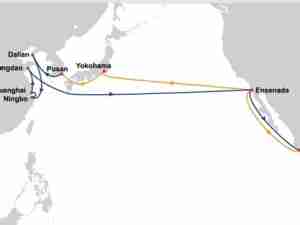Container shipping lines serving the Asia-US freight market say average rate levels achieved in the latest round of service contract negotiations are not sustainable over the typical 12-month 2009-10 contract term.
As a result, lines in the Transpacific Stabilization Agreement (TSA) have adopted a voluntary guideline across-the-board increase of $500 per 40-foot container (FEU, with proportionate increases for other equipment sizes, to take effect August 10, 2009. The increase will apply to rates for all commodities and all U.S destinations. TSA carriers said they would also pursue full implementation of the quarterly bunker fuel charge, which adjusted upward on July 1 to reflect higher fuel prices. And they added that the planned GRI does not preclude the possibility of a peak season surcharge if the market measurably strengthens and extensive peak season costs are incurred.
TSA noted that 2009-10 contracts were negotiated in the midst of a severely depressed global economy, in which first quarter 2009 cargo demand from Asia to the US was more than 20% below levels of a year earlier, and conditions during the second quarter have shown only slight improvement. Competitive pressures to keep services operating and avoid further costly vessel layups eroded even the minimum rate levels carriers tried to put in place in the trade in April. TSA reports a $1,000-1,200 drop in average revenue per container during the period from October 2008 through May 2009 alone.
'The eastbound transpacific trade lane has been driven by panic, and panic is difficult to stop once it has begun,' said W.W. Lee, Chief Executive for Container Liner Business at Hanjin Shipping, Ltd. 'With 2009-10 contracting nearly completed, lines have had a chance to assess the damage. From an industry wide point of view the damage is serious, and if current rates are extended out over 12 months, it is likely that the trade will encounter significant financial challenges as well as basic service sustainability issues going forward.'
In certain cases, it will be necessary for lines to engage with shippers in a renegotiation of contracts that do not provide for some form of interim rate adjustment. TSA acknowledged that container lines should not have given in to pressure to match short-term, concessionary rates in the market at the time contracts were being negotiated. But the group also shared concerns voiced by customers in recent months that revenue deterioration would eventually lead to fewer lines operating at reduced service levels.
'Market forces will ultimately dictate how the current situation resolves itself,' said Evergreen Marine Corp. President Jack Yen. 'In the end this is about the cost of maintaining a viable transportation and logistics service in a challenging market, and investing for the eventual turnaround. Transpacific carriers did not make a strong enough case in their negotiations for stabilizing revenue in the coming year. But the fundamental problems remain, as can be seen in carrier quarterly earnings reports and continued carrier and service consolidation.'
TSA is a research and discussion forum of major container shipping lines serving the trade from Asia to ports and inland points in the US. (TSA)





